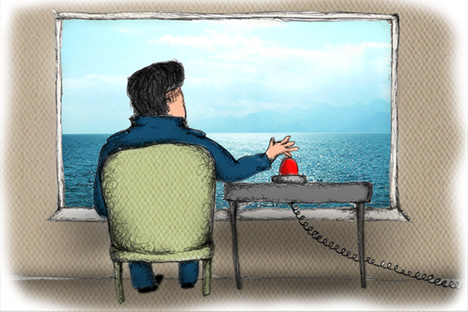North Korea ready to break the truce?

Drawing by Niyaz Karim
North Korea has announced that it is ready to break the armistice agreement that has been in force on the Korean peninsula since 1953. The decision was prompted by the large-scale military exercises that are being performed at the border of the Democratic People's Republic of Korea by the United States and South Korea. It appears that this rhetoric is connected to the fundamentally new political situation that has been developing in North Korea since the arrival of young leader Kim Jong-un.
The Democratic People's Republic of Korea “no longer considers itself bound by the armistice agreement signed at the end of the Korean war in 1953, due to the gross violation of its terms by the United States of America and South Korea,” read a statement released by the North Korean military mission in the demilitarized zone on Aug. 21. The statement stressed “the people and army of the Democratic People's Republic of Korea may at any moment resort to physical countermeasures to ensure its sovereignty and peace.”
This is a continuation of sorts of the recent rhetoric of North Korean leader Kim Jong-un, who ordered his country’s military leaders to “keep an eye on the enemy and inflict deadly retaliatory strikes if any one of them is to enter North Korean waters.”
Related :
Strictly speaking, this is not the first such statement to be made by North Korean authorities—it has become their standard form of protest against U.S.-South Korean military exercises. But this one was delivered in unusually harsh tones. Georgy Toloraya, director of the Korean Research Program at the Institute of Economics at the Russian Academy of Sciences believes that the statement was dictated by reforms started by Kim Jong-un, who is still a relatively new leader. “The North Koreans want to make it clear that, although the arrival of Kim Jong-un has brought with it a certain relaxing of everyday life, the country continues to be combat ready and alert to any encroachment on its sovereignty. It is a warning to the international community that this situation should not be used as a reason to provoke North Korea,” Toloraya said.
At the same time, it seems that North Korea is hoping to attract the attention of the United States, to open up a dialogue that may take place after the presidential elections.
Meanwhile, Viktor Pavlyatenko, lead researcher at the Russian Academy of Sciences’ Institute for Far Eastern Studies, believes that the statement’s harsh tone demonstrates the balance of power in North Korea following the change of leadership. “It’s diplomatic bravado on the part of North Korea—nothing more than a reflection of the balance of power in Pyongyang. It shows that the older members of the party and senior military leaders have held on to their power and have an influence over their young leader,” Pavlyatenko said.
The large-scale military maneuvers are no doubt a concern for Pyongyang. The exercises, which will last until Aug. 31, will involve 30,000 troops from the US, and 56,000 from South Korea. They will be observed by representatives from the UK, Australia, Canada, New Zealand, Denmark, Norway, and France.
Kim Jong-un ordered the North Korean armed forces be ready to strike South Korea when the exercises began in the event that gunfire should reach his country, the Korean Central News Agency reported.
But the country is not ready for an exacerbation of the situation, according to Toloraya. “I don’t think that North Korea wants the situation to escalate because it will lead to further isolation, sanctions, and a deterioration of the economic situation,” Toloraya said.
North Korea has been allowing concessions in more than just ideology over the past three months. There has been serious talk about reforming the country’s agriculture along the lines of the Chinese model so that the people can be fed at last. Conflict is the last thing the country needs.
As Pavlyatenko points out, “materially, politically, and financially, Korea is simply not ready for a confrontation.”
Andrei Ilyashenko is Voice of Russia's columnist on the Middle East issues.
All rights reserved by Rossiyskaya Gazeta.
Subscribe
to our newsletter!
Get the week's best stories straight to your inbox